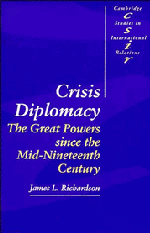Book contents
- Frontmatter
- Contents
- List of tables
- Acknowledgments
- I PART I
- PART II
- 4 The Eastern crisis, 1839–1841
- 5 The Crimean war crisis, 1853–1854
- 6 The Russo-Japanese crisis, 1903–1904
- 7 The Sudeten crisis, 1938
- 8 The Franco-Prussian and Agadir crises
- 9 Pearl Harbor and the Berlin crises
- PART III
- PART IV
- Notes
- Select bibliography
- Index
- CAMBRIDGE STUDIES IN INTERNATIONAL RELATIONS
5 - The Crimean war crisis, 1853–1854
Published online by Cambridge University Press: 03 May 2011
- Frontmatter
- Contents
- List of tables
- Acknowledgments
- I PART I
- PART II
- 4 The Eastern crisis, 1839–1841
- 5 The Crimean war crisis, 1853–1854
- 6 The Russo-Japanese crisis, 1903–1904
- 7 The Sudeten crisis, 1938
- 8 The Franco-Prussian and Agadir crises
- 9 Pearl Harbor and the Berlin crises
- PART III
- PART IV
- Notes
- Select bibliography
- Index
- CAMBRIDGE STUDIES IN INTERNATIONAL RELATIONS
Summary
This case offers the clearest example of lost opportunities: it is the case in which factors such as misunderstanding, inadvertently misleading signals and accidents of personality and timing played the greatest part in determining the outcome. The underlying tensions, though important, were not such as to necessitate a European war. Thus, the crisis is a rich source of negative lessons for crisis diplomacy, and for this reason its ‘mismanagement’ is given special emphasis. While this general view is endorsed by most historians, some significant differences over the interpretation of the crisis, especially over Britain's role, will be noted.
At the level of the international system, the outstanding feature of the case, compared to the preceding Eastern crisis, was the decline in the efficacy of the Concert of Europe. Since there is no consensus on the reasons for this, nor on which of the actors, if any, bears the primary responsibility, these questions will need to be examined closely; but in view of the difficulties experienced in the successful Concert diplomacy of 1840 – 41, its breakdown in the next great Eastern crisis is not surprising. The alignment of the powers – a return to the ‘relationship of major tension’ between Britain and Russia – was less favourable to diplomacy than in 1840; the revival of old hostilities led British public opinion to adopt an extreme anti-Russian stance.
- Type
- Chapter
- Information
- Crisis DiplomacyThe Great Powers since the Mid-Nineteenth Century, pp. 69 - 105Publisher: Cambridge University PressPrint publication year: 1994

